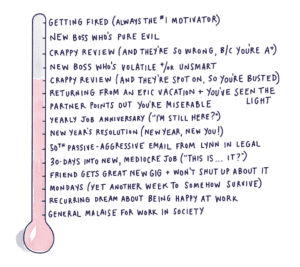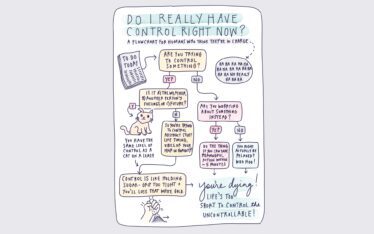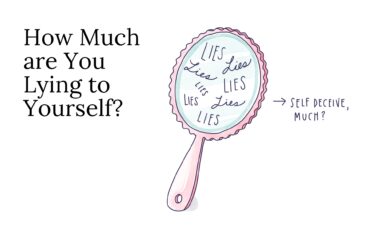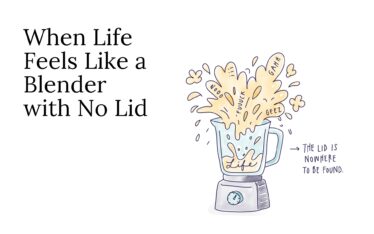Not if — but when — you are unhappy at work, what — if anything — do you do about it?
a) Nothing… work is supposed to suck, and then we die.
b) I quit… burning all the bridges behind me with strange satisfaction.
c) I try to make it right… looking inward first to see where I might need to approach the situation differently.
d) I do nothing… replaying every conversational transgression and antagonistic email, in painstaking detail, to anyone in my life who’ll listen. But I don’t look for a new job.
If you answered “c” you are a better person than most (or a liar!). The vast majority of your peers chose the other options and you know this is true because you’re the one nodding as they replay every slight from Mindy in marketing and Reg in accounting.
Most of us will spend 90,000 hours of our lives working, and by my latest estimation, 89,750 of those hours will be spent in a state of moderate to severe career anxiety. (The only reason the remaining 250 work hours are half-decent are because they involve cake: birthday cakes, baby shower cakes, retirement cakes. That’s the only reason we’re okay with going back into the offices again — for the cake.)
As a coach who knows a thing or two about work woes, our career disquietudes often sound like this:
- “I’m so overworked”
- “I’m so underpaid”
- “I’m so unfulfilled”
- “I’m so micromanaged”
- “I’m so underutilized”
- “WHY THE FUCK DID I CHOOSE _____?!” (Insert your profession of choice here — although in my experience with clients, it’s usually law.)
- “Is it wrong for me to fantasize about my boss’s untimely demise?” (No! Unless you’re the one doing the demising, if you know what I mean.)
- “I’m not sure I’m where I’m supposed to be in my career, you know?” (I do know, friend.)
Gallup tells us that 61% of U.S. workers report being disengaged at work, and 52% of workers are planning to look for a new job this year. Most people who plan to look don’t follow through with it, because they’re either too busy being busy with their deenergizing job, or too defeated by the job search process that they throw in the towel at the first job description that asks them to be someone they’re not — that better version of themselves with an advanced degree and more years of experience “leading change in a fast-paced environment” than they’ll ever have.
Despite our apparently widespread disdain for work, many of us disengaged worker bees are mentally checking out yet doing diddly squat about the leaving part. We have a tremendous capacity to adapt to lackluster work situations, don’t we? Except here’s the rub: we think we adapt, but we’re really just settling, and uncomfortably at that.
- Not liking work and complaining about it to your partner, friend, and guy behind the meat counter at Whole Foods isn’t called adapting. It’s called a cry for help and you’re the only one not hearing it.
- Not liking work and finishing the day with more martinis (or Milky Way ice cream bars — so I’ve heard) than you care to admit isn’t about adapting. It’s called coping, and not in the good way.
- Not liking work and letting that feeling of stuckness cement you to the ground when you don’t know how to do the un-sticking — that isn’t about adapting. It’s called paralysis, and it’s the fastest way I’ve seen to erode confidence, agency, empowerment, and other important self-help buzzwords. (Oh! Self-efficacy! That’s a good one here, too.)
What’s your tipping point?
Malcolm Gladwell described a tipping point as, “the moment of critical mass, the threshold, the boiling point.” When it comes to your career, what does it take to shift you from disenchantment to action? What is your boiling point — or maybe more accurately for you, your breaking point?

It is precisely here that I get all worked up. Many of us wait for things to boil before we take action. We lose sight of the days and weeks and years that led up to the boiling point, not seeing that we were in some pretty hot water for longer than we maybe needed to be. Maybe we carried a lot of straws for a lot of months before that last one broke our proverbial backs. Did we have to carry so many straws, for so long?
Our lives are too short to tolerate jobs that stab our souls to death. Our lives are also too short to settle into jobs that feel consistently unfulfilling/ unsuccessful/ un-anything that matters to you. Your 90,000 hours of work can (and should!) be challenging — no one ever said work was supposed to be easy-breezy — but they just aren’t allowed to be soul-sucking.
Life is a string of minutes and days all strung together, and our happiness/ unhappiness is really just a collection of how many moments we perceived as upbeat, neutral, or downbeat. If you’re on the path to the tipping point, you’re having more downbeat moments than your life deserves.
I get what it’s like to languish in a career for an unfortunately-not-brief amount of time. It’s not the kind of living I ever want to do again, because it’s not living — it’s death by a thousand paper cuts. And here’s the thing that I now see with crystal clarity: if someone gets 12 or 13 paper cuts in a row, they need to start figuring things out. By the 150th paper cut, the writing is on the wall. So if someone dies at the thousandth paper cut, I’ll attend the virtual memorial and all, but I’m kind of thinking they’re the sucker. They should have at least made a career move by the 350th cut, yes?
What to do about your career tipping/ breaking point:
- Take your “career calamity” pulse. How would your loved ones describe how they think you feel about your career? Get them to assign a 1 – 10 number and see if it matches what you’re thinking. It’s a real conversation opener if you say, “a solid 6!” and your partner says, “can we use minus numbers?”
- Set the timer. Many of my clients agree to initiate a change by a certain date, or within “x” months… as a way to stay accountable to Making Something Happen. One dynamo of a woman I’m working with has set a 6 month expiry on her current dead-end job. How much time do you want to have left?
- Happy birthday to you. Job searches spike 12% before birthdays, especially the ones with zeros that have the potential to trigger midlife crises, like 40 or 50. Does the idea of making a change before your next birthday motivate you?
- Happy anniversary to you. Research shows that people tend to stay at jobs in 12-month increments, with the 12th month having the highest probability for bolting (meaning the 1st anniversary on the job has the greatest risk). The quitting probability declines after month 12 and then spikes again at month 24 and then continues annually… you get the idea. It’s a yearly thing that motivates us to reassess. When is your anniversary, and do you want to enter into another year of life in this job?
- Go on vacation already. 70% of people are more likely to look for another job upon returning from vacation — something to do with the mental detachment, relaxed vibe, and a lot of piña coladas. Do you need a break to gain some valuable perspective, and come back emboldened to take action?
- Do one thing. Just as a start. Maybe that’s asking to meet with your boss to gather feedback, or to ask for a 360º assessment. Maybe it’s brushing up your LinkedIn profile & resume. Maybe you activate your network (dear God I hate that expression, but you know what I mean — reconnect with acquaintances to sniff out what’s out there). Maybe you work with a coach to get clear on your career story, strengths, opportunities, and pathways. Maybe you start talking to people in jobs/ organizations/ industries you’re curious about. Maybe you register for classes to finish your degree. What is one step you can take, starting today?
- Focus on the end. On your deathbed, will you regret not slugging it out at your current job? If so, find a way to try and fix things. Will you regret not leaving sooner, even if it’s scary? If so, summon the courage and stir the pot of change. Will you regret not eating more chocolate pudding? Me too.
If you are starting to say things like, “the devil I know is better than the devil I don’t know” about your job, you must slap yourself in the face immediately (or call me and I’ll do it over Zoom for you).
You can do hard things. Leaving a crappy job isn’t nearly as hard as staying in the job and convincing yourself that “it’s fine.” Fine is the f-word that is responsible for that lethal 1000th paper cut. You’re so much better than fine.







